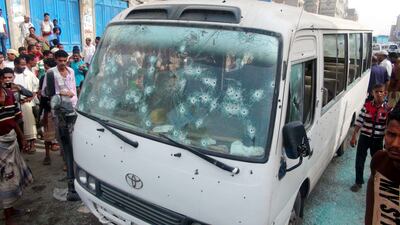SANAA // Yemeni troops surrounded a mosque controlled by ousted president Ali Abdullah Saleh on Sunday amid fears he is plotting a coup, days after the former strongman’s media outlets were silenced.
Also on Sunday, an Al Qaeda suspect killed eight people in the south and fresh clashes erupted between security forces and Shiite Huthi rebels in the north, ending a United Nations-mediated 11-day truce.
Yemen’s presidential guard, backed by armoured vehicles, has blocked access to the large Al Saleh mosque in southern Sanaa since late Saturday, said a witness.
Mr Saleh ruled Yemen for 33 years before he was forced out in February 2012 and replaced by his long-time deputy Abdrabuh Mansur Hadi under a UN- and Gulf-sponsored deal.
A source close to the presidency said that weapons had been stored in the mosque and were being guarded by gunmen loyal to Mr Saleh.
A tunnel connecting the site to the presidential palace had also been discovered.
Mr Hadi suspects his predecessor is “plotting a coup”, the source said, without elaborating further.
Mr Saleh, who has his own bodyguards, boosted security around his residence in the Hada district, also in south Sanaa.
He still heads the influential General People’s Congress (GPC) party which holds half of the government’s ministries and retains the loyalty of some elements in the military.
Critics accuse him of impeding the deeply tribal country’s political transition.
The mosque siege came days after authorities closed the Yemen Today newspaper and television channel owned by Mr Saleh.
The media outlets have often been accused of biased coverage of the post-Saleh government and of inciting protests in Sanaa against power cuts and water and fuel shortages.
Mr Hadi, who is the GPC secretary general, sacked several ministers on Wednesday, including veteran foreign minister Abu Bakr Al Kurbi, known for his ties to Mr Saleh who appointed him.
Mr Kurbi was replaced by UN ambassador Jamal Abdullah Al Sallal, another GPC member who is close to Mr Hadi, sources in Sanaa said.
As political tensions simmered in the capital, a suspected Al Qaeda gunman raked an army minibus carrying military hospital staffers in the main southern city of Aden, killing eight people, a military official said.
Two women were among the dead and 12 people were wounded.
“The bus was carrying doctors and nurses working for the military hospital in Aden,” the official said.
“A mother who was with her two children on board” was wounded, he said.
The official blamed Al Qaeda for the attack, which comes as the army presses an all-out offensive launched in late April against jihadist strongholds in the southern provinces of Shabwa and Abyan.
The army says 500 Al Qaeda militants have been killed in the offensive, while 40 soldiers have died and 100 were wounded.
Al Qaeda had seized swathes of the south and east, taking advantage of a collapse of central authority during the 2011 uprising that forced Mr Saleh out.
They remain deeply entrenched in the Hadramawt province farther east, where they have launched a series of spectacular assaults in past months.
Washington regards the Yemen-based Al Qaeda in the Arabian Peninsula (AQAP) as the network’s deadliest affiliate and has stepped up drone strikes targeting its leaders.
In the north, a truce agreed on June 4 between troops and Shiite rebels collapsed on Sunday.
Renewed fighting in Amran province closed the road linking it to the capital, sources said.
No immediate casualty figures were known.
Huthis, who have been battling the central government for years, are suspected of trying to expand their sphere of influence as Yemen is split into six regions, advancing from their mountain strongholds in the far north closer to Sanaa.
* Agence France-Presse

